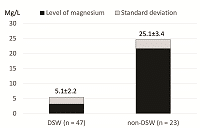
Acute Myocardial Infarction Severity, Complications and Mortality Associated with Lack of Magnesium Intake through Consumption of Desalinated Seawater
2Department of Cardiology, Galilee Medical Center, Azrieli Faculty of Medicine, Bar Ilan University
3Management Department, Bar Ilan University
Background: Drinking water (DW) is an important dietary source of magnesium. Israel has recently increased desalinated seawater (DSW) production for DW, but negligible magnesium content in DSW may pose risk of hypomagnesemia and consequential adverse cardiovascular effects.
Methods: Consecutive acute myocardial infarction (AMI) patients (n = 380, age 35–75 years), hospitalized in 2015-2017 with ST-segment elevation myocardial infarction (STEMI) were divided into two groups based on whether they lived in a region supplied mainly by DSW (n = 250, 65%)or not (non-DSW; n = 130, 35%). We evaluated admission serum magnesium levels in patients, magnesium levels in tap water, 1-year all-cause mortality, and major adverse cardiovascular events (MACE), including all-cause mortality, non-fatal myocardial infarction, re-hospitalization for heart failure or angina pectoris, stroke, coronary artery bypass grafting, and percutaneous coronary interventions. Multivariate analyses were adjusted for age and sex.
Results: Serum magnesium levels (mean ± SD) were significantly higher among patients in the non-DSW group compared with the DSW group (1.95 ± 0.20 mg/dL and 1.81 ± 0.20 mg/dL, p < 0.001; respectively) (Figure). Additionally, mean residential DW magnesium level in the DSW group was 5.4±2.2 mg/L compared with 25.1±3.4 mg/L, p <0.01 in the non-DSW group. Fewer patients (although not statistically significant) in the non-DSW group experienced major adverse cardiovascular events (MACE) or 1-year-all-cause mortality compared with patients in the DSW group (12.4% and 20%, p = 0.065; respectively).
Conclusion: In post AMI patients, we found non-significant higher MACE and 1-year mortality with the use of DSW.

Powered by Eventact EMS